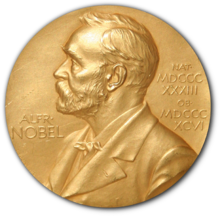Next Tuesday, Nobel prize in Physics will be announced. The announcement will be broadcast from the Karolinska Institute in Stockholm.
To my surprise, I have been reading several articles (see e.g. this one) forecasing this year Nobel prize to Peter Higgs and even tring to anticipate whom he will share the prize with. IMHO, it would be a huge mistake if Higgs eventually is awarded this year. Obviously, not that this prize wouldn't be well deserved and all, but it has been a few months since the CERN results were announced and several other measurements are in order to understand the nature of this new boson. Given the known policy of Nobel prizes (i.e. regardless the importance of possible theoretical breakthroughs, the latter must be supported by experiments*), such nomination this year would be definitely premature. Anyway, it wouldn't be the first time the Nobel committe suprises the community (see the recent case with Cabibbo)... so one never knows...let's wait one day more for the verdict.
* An example being Stephen Hawking's studies of black hole thermodynamics, which have been crucial in several areas, and eventually even for the very development of the AdS/CFT duality. Most likely, Hawking won't be ever awarded for those studies because, although pioneristic and instrumental in current theoretical physics, they cannot be directly observed (but the Nobel committee or some smart experimentalist can always prove me wrong).


3 comments:
You can find the live webcast of the event here: http://www.nobelprize.org/index.html
For The Nobel Prize in Physics: Tuesday 9 October, 11:45 a.m. at the earliest.
The prize will be announced by Staffan Normark, Permanent Secretary of the Royal Swedish Academy of Sciences.
For the past month the Joint Quantum Institute (JQI) has sponsored a website allowing visitors to vote for the topic they believe will capture this year’s Nobel Prize for physics. The site offered 14 Nobel-worthy topics and some representative names to go with each topic. For the results you can visit this page: http://jqi.umd.edu/news/350-physics-nobel-prize-poll.html
Here is the official press release about this morning's physics Nobel from the Royal Swedish Academy of Sciences
The Nobel Prize in Physics 2012
The Royal Swedish Academy of Sciences has decided to award the Nobel Prize in Physics for 2012 to
Serge Haroche
Collège de France and
Ecole Normale Supérieure, Paris, France
and
David J. Wineland
National Institute of Standards and Technology (NIST) and
University of Colorado Boulder, CO, USA
“for ground-breaking experimental methods that enable measuring and manipulation of individual quantum systems”.
Particle control in a quantum world
Serge Haroche and David J. Wineland have independently invented and developed methods for measuring and manipulating individual particles while preserving their quantum-mechanical nature, in ways that were previously thought unattainable.
The Nobel Laureates have opened the door to a new era of experimentation with quantum physics by demonstrating the direct observation of individual quantum particles without destroying them. For single particles of light or matter the laws of classical physics cease to apply and quantum physics takes over. But single particles are not easily isolated from their surrounding environment and they lose their mysterious quantum properties as soon as they interact with the outside world. Thus many seemingly bizarre phenomena predicted by quantum physics could not be directly observed, and researchers could only carry out thought experiments that might in principle manifest these bizarre phenomena.
Through their ingenious laboratory methods Haroche and Wineland together with their research groups have managed to measure and control very fragile quantum states, which were previously thought inaccessible for direct observation. The new methods allow them to examine, control and count the particles.
Their methods have many things in common. David Wineland traps electrically charged atoms, or ions, controlling and measuring them with light, or photons. Serge Haroche takes the opposite approach: he controls and measures trapped photons, or particles of light, by sending atoms through a trap.
Both Laureates work in the field of quantum optics studying the fundamental interaction between light and matter, a field which has seen considerable progress since the mid-1980s. Their ground-breaking methods have enabled this field of research to take the very first steps towards building a new type of super fast computer based on quantum physics. Perhaps the quantum computer will change our everyday lives in this century in the same radical way as the classical computer did in the last century. The research has also led to the construction of extremely precise clocks that could become the future basis for a new standard of time, with more than hundred-fold greater precision than present-day caesium clocks.
______________________________________________________________________
Serge Haroche, French citizen. Born 1944 in Casablanca, Morocco.
Ph.D. 1971 from Université Pierre et Marie Curie, Paris, France.
Professor at Collège de France and Ecole Normale Supérieure, Paris, France.
www.college-de-france.fr/site/en-serge-haroche/biography.htm
David J. Wineland, U.S. citizen. Born 1944 in Milwaukee, WI, USA. Ph.D. 1970 from Harvard University, Cambridge, MA, USA.
Group Leader and NIST Fellow at National Institute of Standards and Technology (NIST)
and University of Colorado Boulder, CO, USA.
www.nist.gov/pml/div688/grp10/index.cfm
______________________________________________________________________
Prize amount: SEK 8 million, to be shared equally between the Laureates.
Further information: http://kva.se/ and http://nobelprize.org/
Post a Comment